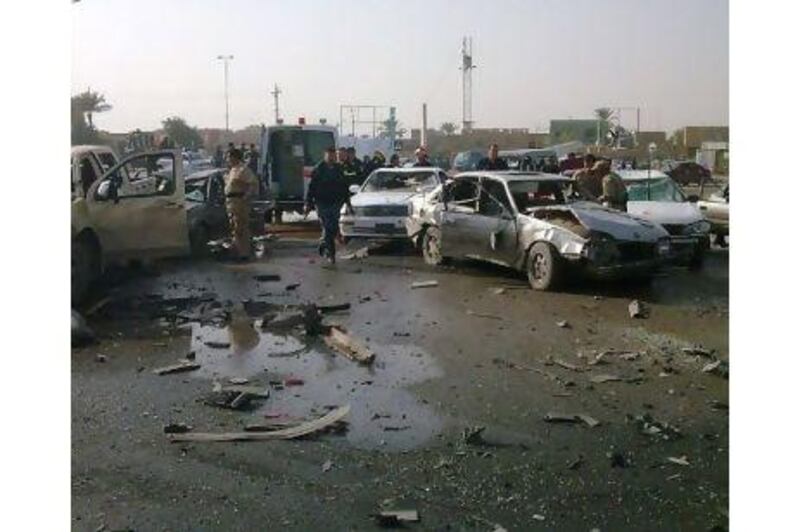BAGHDAD // A suicide car bomber attacked a fortified government compound in Ramadi yesterday, killing 13 people and wounding 40 others.
Iraqi security forces blamed al Qa'eda for the assault, which appeared to include two bombs, the second left at a main bus terminal. There were conflicting reports as to whether the second device detonated as planned or was discovered and deliberately triggered by security units in a controlled blast.
Six police officers were killed, according to hospital officials. The other dead and wounded were civilians, out in the busy central administrative area of the city when the blast took place.
Al Qa'eda militants used to have a strong presence in Anbar and Ramadi, its provincial capital, 115km west of Baghdad, before US and government military operations, and the establishment of Sahwa tribal councils, loosened its grip.
"It looks like al Qa'eda is trying to send a message to the provincial government and the people of Anbar that they are still here," said Issam Saadoun, the head of the city's security and defence council.
Rather than showing renewed strength, he insisted the blast was evidence of al Qa'eda's weakness.
"They have tried many times to carry out such attacks and the security services have always stopped them," he said. "They want to try to convince people they are powerful and to co-operate with them but people here do not believe in al Qa'eda, they are still with the government."
That assessment was not shared by Mohammad al Dulaimi, a political science professor at Anbar University. "They attacked the government compound, which is al Qa'eda saying, 'We can get you any time and anywhere'," he said.
Mr al Dulaimi said the militant group was renewing its power base in Anbar, and had extensive contacts inside the security services, which enabled it to carry out the bombing.
"Al Qa'eda has loyalists working inside the security forces," he said. "They draw their pay and work as other security officers, but they are really with al Qa'eda and help them. It's a corruption that must be tackled if al Qa'eda is to be defeated, and it is something that the central authorities in Baghdad must take responsibility for doing because the Anbar authorities will not."
Another co-ordinated bombing hit Diyala province, in eastern Iraq yesterday. The first suicide blast killed a pilgrim and his son, en route to a parade to celebrate Ashura, an important date on the Shiites' religious calendar and a regular target for Sunni militants. A follow-up blast then injured a senior police officer and a council member.
Both Anbar and Diyala have been al Qa'eda strongholds and the group has doggedly retained a presence despite efforts to vanquish them.
Yesterday's attacks come as politicians continue to squabble over the formation of a new government. The prime minister, Nouri al Maliki, is in the process of forming his ruling cabinet, but huge questions remain about the make-up and viability of a power-sharing formula drawn up to end eight months of post-election deadlock.
The Sunni-backed Iraqiyya bloc has threatened to pull out of the proposed national unity government, accusing the Shiite-backed prime minister of trying to retain a monopoly on power.
[ w@foreigndesk.ae ]





